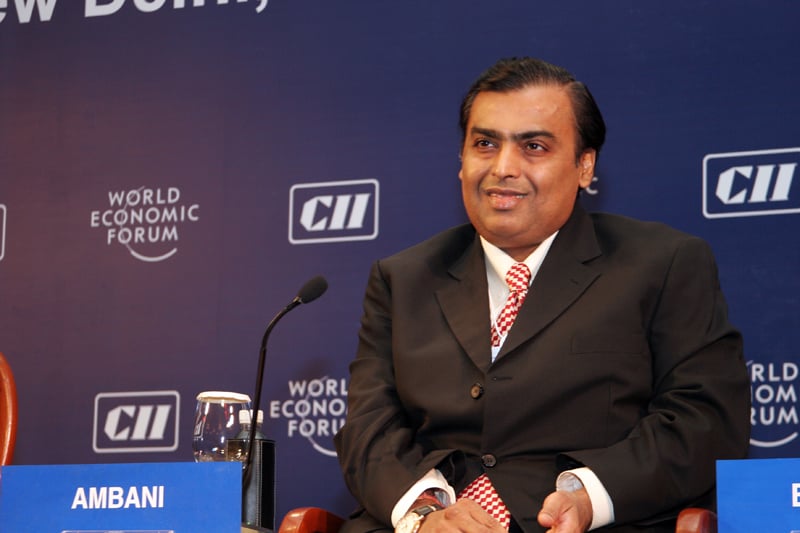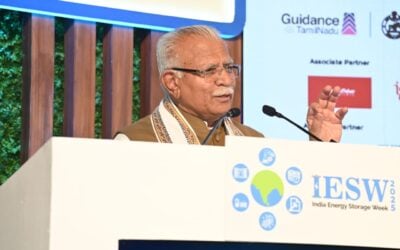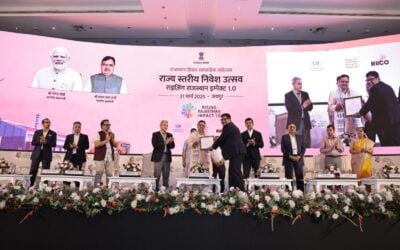
Indian multinational conglomerate Reliance Industries is on track to open solar and battery storage production facilities by the end of this year and next, respectively.
According to a statement by Reliance Industries chairman and managing director Mukesh Ambani, production of solar PV modules will begin before the end of this year, while production at a battery gigafactory will begin in the second half of next year.
Enjoy 12 months of exclusive analysis
- Regular insight and analysis of the industry’s biggest developments
- In-depth interviews with the industry’s leading figures
- Annual digital subscription to the PV Tech Power journal
- Discounts on Solar Media’s portfolio of events, in-person and virtual
Speaking at the group’s 47th AGM on 29 August in Mumbai, India, Ambani presented the developments as part of a strategy to further Reliance’s involvement in deep-tech sectors and advanced manufacturing, supporting a developed India (or ‘Viksit Bharat’).
Reliance is perhaps better known for its involvement in the oil and gas sectors, but it has diversified into a very broad range of business areas, including telecoms, financial services, textiles, and beauty products, as well as renewable energy technology and plant development.
The company’s Reliance New Energy subsidiary is building a US$7.2 billion green energy manufacturing complex in Jamnagar, Gujarat.
The site will eventually include solar PV, battery cell and storage systems, electrolysers, raw and auxiliary materials, power electronics and semiconductor production facilities, and an R&D centre.
Bi-facial PV module efficiency to exceed 26% from the start
Reliance New Energy Solar acquired REC Group in 2021 and is leveraging the Singapore-headquartered solar manufacturer and materials company’s tech for its integrated solar production facilities. In 2022, it said the plant, with an initial 10GW of annual production capacity across a range of components, would start coming online during 2024.
Reliance chairman Ambani confirmed in his AGM statement that the factory will be making heterojunction PV modules by the end of this year. The integrated facility will begin producing other components “in the following quarters,” Ambani said, including cells, glass, wafers, ingots and polysilicon.
“Our gigafactory is designed for modular expansion at minimal cost and in the shortest time possible,” the chairman said.
“We have fully integrated and indigenised the HJT technology from REC Singapore, our wholly owned subsidiary, to develop first-Gen bifacial solar panels with cell efficiency exceeding 26%.”
R&D investments in Singapore and India will drive continuing improvements of those products, Mukesh Ambani claimed.
In early 2023, Reliance Industries signed a 5.2GW heterojunction module automation production line supply agreement with Chinese equipment supplier SC Solar, as reported by sister site PV Tech.
Reliance plans ‘backward’ vertical integration in battery production
Meanwhile, production will commence by the second half of next year at its battery and energy storage facility at the Jamnagar complex, the chairman said at last week’s AGM.
It will have an eventual 30GWh annual production capacity for batteries based on advanced chemistry cell design. However, initially, it will be building battery energy storage system (BESS) solutions for the utility-scale segment as well as battery packs for residential and commercial & industrial (C&I), telecoms and mobility markets.
“Progressively, over the next few quarters, we will integrate backward to cell manufacturing and eventually to battery chemicals production,” Ambani said.
The chairman claimed these steps would create “the world’s only fully integrated battery gigafactory, driving synergies across the value chain.”
Reliance was one of a number of domestic and foreign companies awarded government support in 2022, under the Production Linked Incentive (PLI) scheme for making advanced batteries.
The battery factory would be highly digitised and include full “track and trace” capability for all materials, components and systems, Ambani claimed, including those at projects deployed in the field.
The battery gigafactory will have a modular design that enables Reliance to ramp up in further 30GWh increments, according to the chairman’s statement.
Reliance is also an investor and owner of companies involved in battery development including US lithium iron phosphate (LFP) battery manufacturer LithiumWerks and UK sodium-ion startup Faradion. It was also an investor in US liquid metal battery maker Ambri and looks poised to take an ownership stake along with fellow investors following the MIT spinoff’s recent bankruptcy proceedings.
This story has been amended from its original form to reflect that Reliance Industries acquired REC Group, and not REC Silicon, in 2021.






